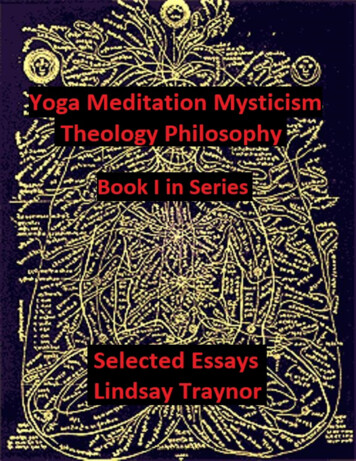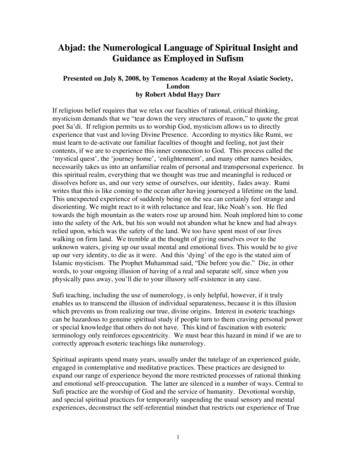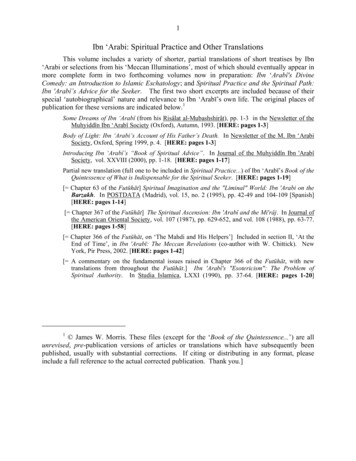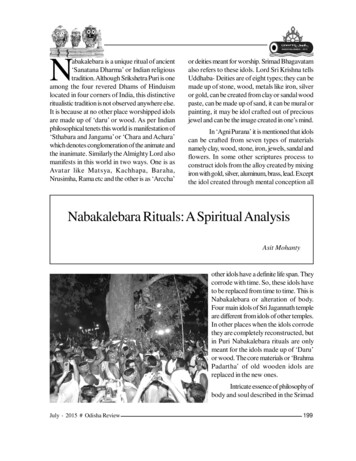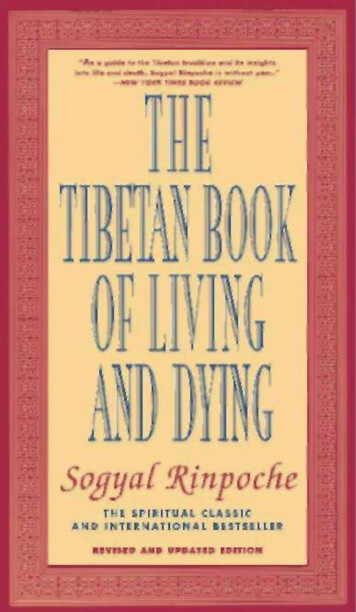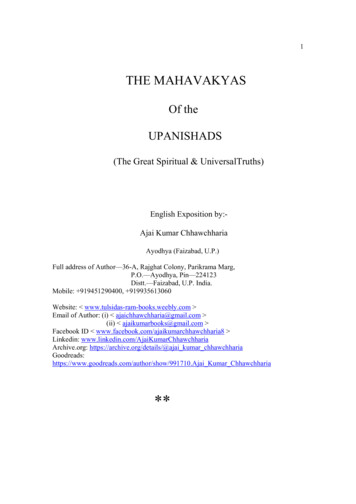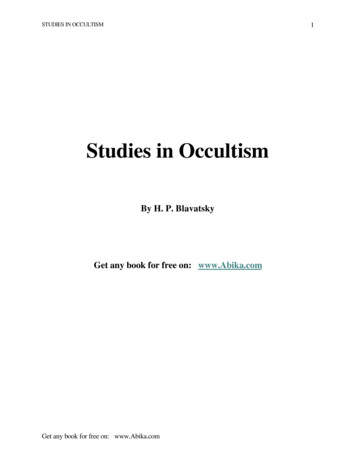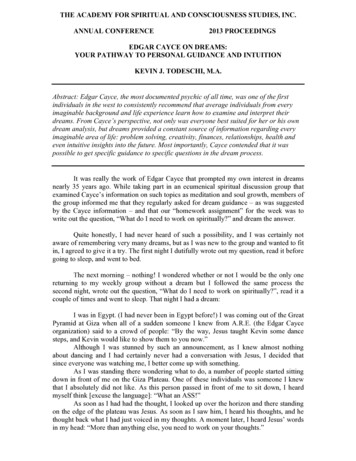
Transcription
THE ACADEMY FOR SPIRITUAL AND CONSCIOUSNESS STUDIES, INC.ANNUAL CONFERENCE2013 PROCEEDINGSEDGAR CAYCE ON DREAMS:YOUR PATHWAY TO PERSONAL GUIDANCE AND INTUITIONKEVIN J. TODESCHI, M.A.Abstract: Edgar Cayce, the most documented psychic of all time, was one of the firstindividuals in the west to consistently recommend that average individuals from everyimaginable background and life experience learn how to examine and interpret theirdreams. From Cayce’s perspective, not only was everyone best suited for her or his owndream analysis, but dreams provided a constant source of information regarding everyimaginable area of life: problem solving, creativity, finances, relationships, health andeven intuitive insights into the future. Most importantly, Cayce contended that it waspossible to get specific guidance to specific questions in the dream process.It was really the work of Edgar Cayce that prompted my own interest in dreamsnearly 35 years ago. While taking part in an ecumenical spiritual discussion group thatexamined Cayce’s information on such topics as meditation and soul growth, members ofthe group informed me that they regularly asked for dream guidance – as was suggestedby the Cayce information – and that our “homework assignment” for the week was towrite out the question, “What do I need to work on spiritually?” and dream the answer.Quite honestly, I had never heard of such a possibility, and I was certainly notaware of remembering very many dreams, but as I was new to the group and wanted to fitin, I agreed to give it a try. The first night I dutifully wrote out my question, read it beforegoing to sleep, and went to bed.The next morning – nothing! I wondered whether or not I would be the only onereturning to my weekly group without a dream but I followed the same process thesecond night, wrote out the question, “What do I need to work on spiritually?”, read it acouple of times and went to sleep. That night I had a dream:I was in Egypt. (I had never been in Egypt before!) I was coming out of the GreatPyramid at Giza when all of a sudden someone I knew from A.R.E. (the Edgar Cayceorganization) said to a crowd of people: “By the way, Jesus taught Kevin some dancesteps, and Kevin would like to show them to you now.”Although I was stunned by such an announcement, as I knew almost nothingabout dancing and I had certainly never had a conversation with Jesus, I decided thatsince everyone was watching me, I better come up with something.As I was standing there wondering what to do, a number of people started sittingdown in front of me on the Giza Plateau. One of these individuals was someone I knewthat I absolutely did not like. As this person passed in front of me to sit down, I heardmyself think [excuse the language]: “What an ASS!”As soon as I had had the thought, I looked up over the horizon and there standingon the edge of the plateau was Jesus. As soon as I saw him, I heard his thoughts, and hethought back what I had just voiced in my thoughts. A moment later, I heard Jesus’ wordsin my head: “More than anything else, you need to work on your thoughts.”
I awoke the next morning absolutely convinced that I had received directguidance regarding my question, “What do I need to work on spiritually?” From that dayforward, I became an enthusiast of dreams.Edgar Cayce has been called the “father of holistic medicine,” “the SleepingProphet,” and “the most documented psychic of all time.” for forty-three years of hisadult life, Cayce was able to enter into a self-induced sleep state and provide psychicinformation, called “readings,” to virtually any question imaginable. He was documentedwith an accuracy rate in excess of 85% for such things as remote viewing healthdiagnosis, exceeding the average accurate diagnosis for modern-day physicians after aninitial visit (Cayce/Cayce 1971, 24). In addition to subjects such as health, philosophy,spirituality and psychic ability, much of the Cayce material deals with dreams and dreaminterpretation. That information first opened up the world of dreams to me and provided afoundation and an understanding that has stood firm for decades.Edgar Cayce emphasized the importance of working with dreams, stating as earlyas 1923 that attempting to understand what he called the subconscious, the psychic, andthe soul forces of each individual should be “the great study for the human family.” Therationale from Cayce’s perspective was that through the study of the subconscious andpsychic part of ourselves we would come to an understanding of the nature of the soul,our connection to one another and our relationship with the Creator.Almost nine hundred of the more than 14,000 Cayce readings on file at Cayce’sAssociation for Research and Enlightenment (www.edgarcayce.org) deal with the subjectof dreams and dream interpretation. Generally, when Edgar Cayce was asked to discussthe meaning of a dream, his wife would simply hold a copy of the dream in her hand andask that the dream be interpreted – without the dream itself ever being read! Even moreamazing is the fact that on numerous occasions when Cayce was provided with anindividual’s request for interpretation, he would remind the dreamer of forgotten portionsof his or her own dream!In terms of the dream material, one of Cayce’s most involved enthusiasts was awealthy, young Jewish stock broker named Morton Blumenthal who received more than500 dream interpretation readings for himself and members of his immediate family.Extremely interested in the nature of the soul and each individual’s relationship to God,one of Morton’s dreams explored this very topic in a humorous vein:Morton dreamed that he was in his apartment in New York City. Suddenly thedoorbell rang and his maid went to answer the door. She announced the presence of a“distinguished visitor” and Morton jumped to his feet in exhilaration with the suddenknowledge that God Himself had come to call. Morton ran up to God and embraced Himwith a hug. God’s appearance was very business-like. He was clean-shaven and cleancut, wore an expensive suit and a derby hat. He also seemed strong and intelligent, justthe sort of man with whom Morton would like to do business.Because God was visiting, Morton decided to give Him a tour around theapartment. Things went well enough until Morton realized they were approaching theliving room and that he had mistakenly left his liquor cabinet half-open. Understandingthat God was omniscient, Morton decided to reveal everything rather than trying to hidehis liquor supply. He flung the cabinet wide open and pointed out the bottles by stating,“In case of sickness.” God’s reply was matter of fact: “You are very well prepared!”Later, when asked for an interpretation, Cayce stated that much of Morton’sdream indicated that each and every individual could have a personal relationship withthe Divine. This interpretation becomes obvious when we consider that God comes to
meet us in the form that we might best recognize Him, that he comes not as somesupreme deity but as someone we might relate to, and that the Creator is extremelyaccepting of us in spite of our imperfections.The Cayce information on dreams suggests that the guidance we obtain in thedream state often addresses the needs of the individual physically,psychologically/emotionally, and spiritually. In terms of dream guidance regarding thephysical, on one occasion Edgar Cayce had been suffering without relief for many dayswith a serious cold and cough. One night he had a dream in which he saw himself mixingspecific ingredients for a cough and cold medicine. Those ingredients were as follows: 4 tablespoons boiling water1 tablespoon honey1 tablespoon simple syrup15 drops tolu in solution2 ounces of whiskey 10 drops glycerin2 drops creosote1 teaspoon syrup of horehound30 drops compound tincture benzoin(Cayce reading #294-189, report 23)Upon awakening, he acquired the necessary ingredient, made the remedy, andfound that it gave him immediate relief.On another occasion, a woman who was very upset about the health of her motherwho was suffering from a number of physical complaints dreamed that her motherappeared to her and said, “You should go to the osteopath. You ought to be ashamed ofyourself! If [your husband] wants you to go to the osteopath, you should go!” (Caycereading 136-45)When the woman asked Edgar Cayce about the dream in a reading, Cayce repliedthat it was actually her mother who needed to see the osteopath and the dream had cometo the dreamer as guidance regarding what she could do to assist her mother.In terms of a physical dream in my own life, when I was a student at theUniversity of Colorado, I was living in one of the oldest dorms, which always seemed tohave a terrible draft in the winter. One night when it was especially cold, the phone rangand it was my grandmother who asked how I was doing. I must have complained aboutthe cold because a week later my grandmother mailed me an electric blanket, which Ibegan using immediately. Each night, I left the blanket plugged in all night and felt warmfor the first time that winter.However, sometime later, I found myself feeling tired and very lethargic eachmorning upon awakening. Since I had always awakened feeling energized and refreshed,I wondered whether or not there was a problem, and even whether I should see a doctor.One night I had a dream:I saw myself standing in the bathroom in my Grandmother’s house, looking in themirror. I had my electric blanket draped over my shoulders and around my body.Suddenly, I opened up the blanket and stared in the mirror. I was horrified to see that mybody was covered with hundreds of leeches.Obviously, the electric blanket was causing some kind of interruption with myown electrical system, so from that day forward I would plug in the blanket to heat up thebed, and then unplug it before getting in.
In terms of psychology and emotional insights from dreams, on one occasion aman who had been married for less than a couple of years was dealing with maritalproblems. He had a dream that seemed to involve him and his wife on a journey:In the dream he was on a train and had apparently been looking out across one ofthe windows, watching the scenery and the various areas they were traveling through passby. All at once he realized that his wife was sitting next to the window. She reportedlyhad a croquet mallet in her hand and was trying to line it up against the window one wayand then another, as if to measure something. In a mixture of frustration and irritation thehusband called out, “You can’t measure it that way!”During the course of a Cayce reading, the husband asked about his dream. Caycesuggested that the dream was actually guidance as to why the couple was havingchallenges in their marriage. The husband was trying to measure the success of theirmarriage by how much money they were making, how much ground they were coveringand how successful they were becoming. On the other hand, his wife was trying tomeasure their marriage by how much fun they were having. They needed to have acollective purpose. (Cayce reading 900-120)A contemporary example about psychological guidance in dreams occurred in thecase of a stock broker who had been involved in the market for about 15 years, but hadchanged firms about six months earlier. One night he had the following dream:“In the dream I am at some kind of a barbecue with a bunch of people from work.At first everything is fine. Some people are carrying plates others have a drink in hand.Everyone is standing around and talking and having a good time. All at once I look downand notice that I am totally naked! I am horrified and feel very insecure, afraid thatsomeone is going to notice. No one seems to notice before the dream ends. However, Iwake up still feeling very insecure.” (Todeschi 2013, 38)When the individual was asked how he felt about his job, he replied, “Well, I havebeen here about six months and they do things a little different than my last firm.Sometimes I worry that I am not catching on as fast as I should.”The dream seemed to be suggesting that as no one else in the dream noticed hewas naked (e.g. unprepared) his insecurities were his own.In terms of spiritual insights and visionary experiences – Cayce suggested thatthis is also the level where intuitive experiences can occur – Cayce had a dream in whichhe saw himself as a tiny speck of sand that began to be elevated as if in a whirlwind. Asthe piece of sand rose, the rings of the whirlwind became larger and larger, each oneencompassing a greater span of space than the one preceding it. There were also spacesbetween each ring that the sleeping Cayce recognized as the various levels ofconsciousness development:
A reading was given on the dream and Cayce suggested that it was actually a“vision” of his own nature of consciousness and illustrated that in waking life heconsidered himself insignificant – no more than a speck of sand – but in the altered statehis consciousness became open to virtually limitless information, time and space. Thisdream led to an understanding that the mind could be understood as having essentiallythree levels of consciousness; Cayce uses the terms conscious, subconscious andsuperconscious to describe these various levels of the mind:Perhaps more importantly, the diagram illustrates Cayce’s premise that symbols(as well as guidance and intuition) come to personal consciousness from both thesubconscious and superconscious mind:
One way to consider the wealth of information available within the subconsciousis to understand the way in which the conscious mind filters out most information andstimulus coming to the individual. A number of scientific studies have suggested that theconscious mind filters out more than 95% of the stimulus coming to it. Although this maysound high, we are generally not aware of such things as the feeling of the clothing onour body, the sensation of the glasses on our nose, the
Edgar Cayce emphasized the importance of working with dreams, stating as early as 1923 that attempting to understand what he called the subconscious, the psychic, and the soul forces of each individual should be “the great study for the human family.” The rationale from Cayce’s perspective was that through the study of the subconscious and psychic part of ourselves we would come to an .


